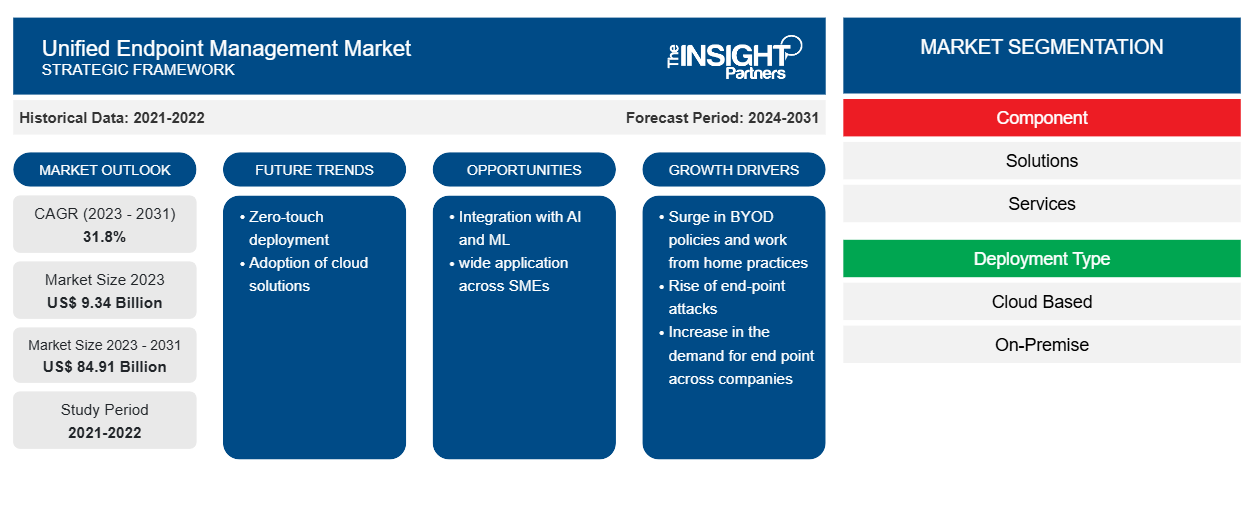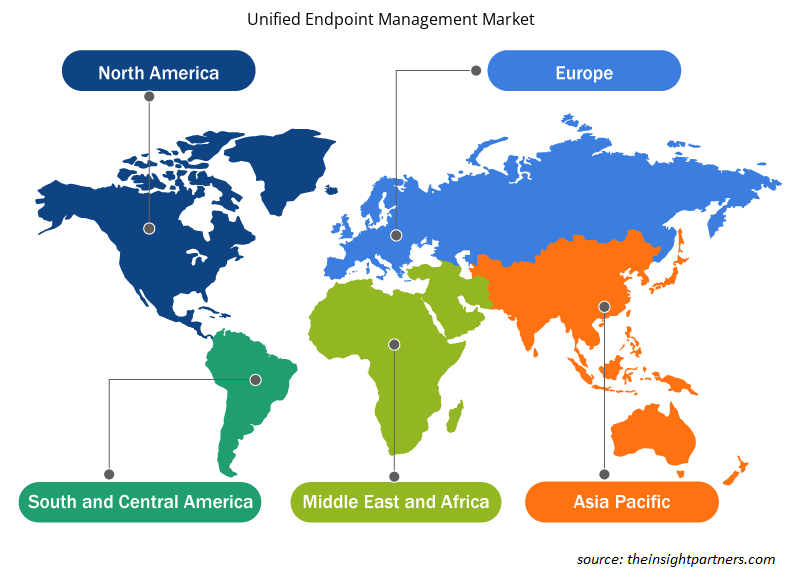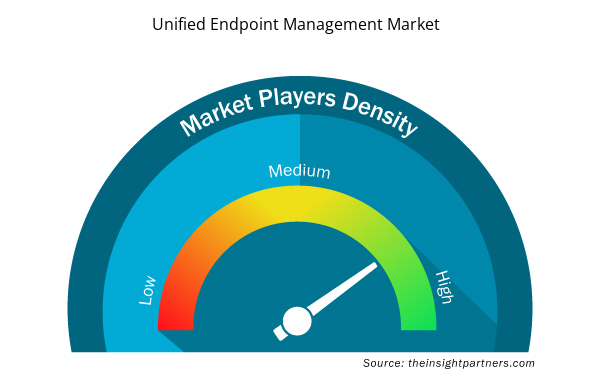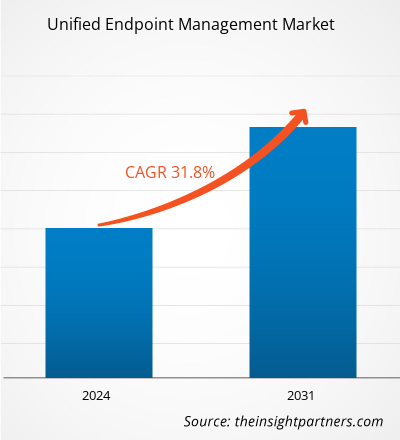The unified endpoint management market size is expected to reach US$ 84.91 billion by 2031 from US$ 9.34 billion in 2023. The market is estimated to record a CAGR of 31.8% during 2023–2031. Zero-touch deployment and cloud-based solutions adoption across enterprises are likely to bring new trends to the market.
Unified Endpoint Management Market Analysis
The growing demand for high security and efficient management of endpoints and the rising trend of a mobile workforce drive the adoption of unified endpoint management solutions across enterprises of different sizes. With the growing trend of digitalization, smart workplaces, and automation, the demand for unified endpoint management solutions is anticipated to rise rapidly in the coming years.
Advancements in information technology and digital applications have increased IT resources worldwide. Based on the report by Cisco, by the end of 2021, there will be over 27.1 billion devices connected to the Internet. Enterprises are increasingly adopting higher-end models to meet the hardware requirements for updated operating systems such as Windows 10 and ChromeOS. With the increasing use of endpoints such as laptops, tablets, mobile phones, and desktops in companies, the need to manage these endpoints from a single platform is increasing, resulting in a rise in the demand for unified solutions. The growing trend of implementing policies that allow personal devices to access corporate data is another factor driving the market.
Unified Endpoint Management Market Overview
Unified endpoint management (UEM) tools offered by various companies allow customers to manage and secure all the servers, devices, and endpoints in an organization from a unified console. It is also a combination of several solutions such as enterprise mobility management, mobile content management, mobile application management, mobile device management, and client management. Unified endpoint management solutions cover different platforms—such as Windows, macOS, iOS, Android, and Wear OS—across various devices, including desktops, laptops, smartphones, tablets, and wearables. These solutions support all mobility use cases in organizations, from corporate-owned, purpose-built, or shared devices to BYOD devices. The key benefits of unified endpoint management solutions include endpoint management, user profile management, dashboards, reporting, mobile device management, and patching & endpoint security. Owing to all the features and benefits, these solutions and related services are becoming increasingly popular among IT & telecom, healthcare, BFSI, government, retail, and other end-user industries.
Customize This Report To Suit Your Requirement
You will get customization on any report - free of charge - including parts of this report, or country-level analysis, Excel Data pack, as well as avail great offers and discounts for start-ups & universities
Unified Endpoint Management Market: Strategic Insights

- Get Top Key Market Trends of this report.This FREE sample will include data analysis, ranging from market trends to estimates and forecasts.
Customize This Report To Suit Your Requirement
You will get customization on any report - free of charge - including parts of this report, or country-level analysis, Excel Data pack, as well as avail great offers and discounts for start-ups & universities
Unified Endpoint Management Market: Strategic Insights

- Get Top Key Market Trends of this report.This FREE sample will include data analysis, ranging from market trends to estimates and forecasts.
Unified Endpoint Management Market Drivers and Opportunities
Surge in BYOD Policies and Work From Home Practices
The onset of the COVID-19 pandemic led to an increased adoption of work from home model, leading to a rise in BYOD policies across various organizations. BYOD allows employees to use personal devices such as tablets, computers, and smartphones to access confidential company data, resources, and applications. According to the report of Cybersecurity Insiders 2021, in total, 82% of organizations use BYOD. A survey conducted by 271 cybersecurity professionals found that 70% of organizations have employees bring their own devices into the workplace. BYOD is also applicable to contractors (26% of organizations), partners (21%), customers (18%), and suppliers (14%). Also, according to Jamf, in July 2023, ~75% of people were using personal devices for office work, which has resulted in 34% increase in productivity; also, organizations can save approximately US$ 250 per employee with a BYOD plus stipend policy. Unified endpoint management helps manage organizations' BYOD policies and provides robust security measures such as encryption and secure access controls, which are crucial for protecting corporate data on personal devices. Moreover, the workplaces encompass a combination of office-based, hybrid, and remote workers who are increasingly using their personal devices to work from anywhere. For instance, as of December 2022, according to "The National Institute of Standards and Technology," more than 95% of organizations allowed employees to use their own devices to work from home. Also, according to Finance Online, the COVID-19 pandemic led 85% of businesses to implement BYOD policies. The growing implementation of BYOD puts pressure on organizations to monitor the overall employee remote work as the diversity of devices accessing corporate networks has increased. Unified endpoint management solutions provide centralized management for all the endpoints. Thus, the surge in BYOD policies and work from home practices boosts the demand for unified endpoint management solutions, which fuels the market growth.
Integration with Artificial Intelligence and Machine Learning
Advanced technologies are rapidly changing the way the IT sector operates. Unified endpoint management solutions use the power of AI and machine learning integrations to broaden overall security strategy with contextual analytics and deeper insights. With cutting-edge methodologies, security teams are able to receive suggestions on alerts, industry policies, malicious threats, etc., which help boost productivity and secure their environment. Machine learning-based security provides a zero-trust architecture that utilizes efficient multi-factor authorization and other authentication, encryption, analytics, and file-system-level rights to prevent the loss of critical data. Further, by enforcing dynamic access rules based on the user's devices, identity, and context, it is possible to ensure that only authorized applications and users can access the protection surface.
Most unified endpoint management providers are incorporating AI and ML into their product lines to enhance their value and differentiate their offerings. AI-based integrated endpoint management provides a widespread approach to device management that can improve security. By utilizing AI algorithms to automate many of the tasks associated with endpoint device management, organizations can reduce the risk of security violations. Further, by providing real-time insights into device health and usage patterns, AI-based unified endpoint management can help organizations prioritize issues and take action before they become significant issues. Also, various companies are integrating AI and ML with unified endpoint management, including Blackberry. Thus, the integration of artificial intelligence and machine learning with unified endpoint management solutions is likely to create new opportunities for the market growth during the forecast period.
Unified Endpoint Management Market Report Segmentation Analysis
Key segments that contributed to the derivation of the unified endpoint management market analysis are component, deployment, platform, organization size, end user, and geography.
- Based on component, the market is divided into solutions and services. The solutions segment dominated the market in 2023.
- By deployment, the unified endpoint management market is bifurcated into cloud-based and on-premise. The cloud based segment dominated the market in 2023.
- In terms of platform, the unified endpoint management market is bifurcated into desktop and mobile. The desktop segment held a larger share of the market in 2023.
- By organization size, the unified endpoint management market is bifurcated into SMEs and large enterprises. The large enterprises segment dominated the market in 2023.
- In terms of end user, the market is segmented into BFSI, IT and telecom, healthcare, automotive, manufacturing, retail, and others. The IT and telecom segment dominated the market in 2023.
Unified Endpoint Management Market Share Analysis by Geography
The unified endpoint management market is segmented into five major regions: North America, Europe, Asia Pacific (APAC), the Middle East & Africa (MEA), and South & Central America. North America dominated the market in 2023, followed by Europe and APAC.
The North America unified endpoint management market is growing significantly owing to increasing investment by companies in advanced technologies to simplify their operations. Additionally, the presence of a large number of unified endpoint management vendors and their consistent efforts to provide security solutions while offering high-quality endpoint management capabilities fuels the market growth in North America. Moreover, the early availability and adoption of digital security tools across the region play a major role in boosting the adoption of unified endpoint management solutions.
Unified Endpoint Management Market Regional Insights
The regional trends and factors influencing the Unified Endpoint Management Market throughout the forecast period have been thoroughly explained by the analysts at Insight Partners. This section also discusses Unified Endpoint Management Market segments and geography across North America, Europe, Asia Pacific, Middle East and Africa, and South and Central America.

- Get the Regional Specific Data for Unified Endpoint Management Market
Unified Endpoint Management Market Report Scope
| Report Attribute | Details |
|---|---|
| Market size in 2023 | US$ 9.34 Billion |
| Market Size by 2031 | US$ 84.91 Billion |
| Global CAGR (2023 - 2031) | 31.8% |
| Historical Data | 2021-2022 |
| Forecast period | 2024-2031 |
| Segments Covered |
By Component
|
| Regions and Countries Covered | North America
|
| Market leaders and key company profiles |
Unified Endpoint Management Market Players Density: Understanding Its Impact on Business Dynamics
The Unified Endpoint Management Market market is growing rapidly, driven by increasing end-user demand due to factors such as evolving consumer preferences, technological advancements, and greater awareness of the product's benefits. As demand rises, businesses are expanding their offerings, innovating to meet consumer needs, and capitalizing on emerging trends, which further fuels market growth.
Market players density refers to the distribution of firms or companies operating within a particular market or industry. It indicates how many competitors (market players) are present in a given market space relative to its size or total market value.
Major Companies operating in the Unified Endpoint Management Market are:
- 42Gears Mobility Systems Pvt Ltd.
- BlackBerry Ltd
- Matrix42 AG
- MobileIron Inc
- Ivanti
- Citrix Systems Inc
Disclaimer: The companies listed above are not ranked in any particular order.

- Get the Unified Endpoint Management Market top key players overview
Unified Endpoint Management Market News and Recent Developments
The unified endpoint management market is evaluated by gathering qualitative and quantitative data post primary and secondary research, which includes important corporate publications, association data, and databases. A few of the developments in the unified endpoint management market are listed below:
- HCL Software, a global leader in enterprise software solutions, announced the launch of its BigFix Workspace and Enterprise solutions, revolutionizing endpoint management and security automation for organizations worldwide. With a focus on enhancing the digital employee experience and ensuring seamless regulatory compliance, these innovative offerings redefine the way businesses approach endpoint management in a dynamic landscape.
(Source: HCL Software, Press Release, March 2024)
- BlackBerry Limited, the pioneer of enterprise mobility management, announced two major new Unified Endpoint Management (UEM) innovations—BlackBerry UEM at the Edge and BlackBerry UEM for the IoT.
(Source: BlackBerry Limited, Press Release, October 2023)
Unified Endpoint Management Market Report Coverage and Deliverables
The "Unified Endpoint Management Market Size and Forecast (2021–2031)" provides a detailed analysis of the market covering the areas mentioned below:
- Unified endpoint management market size and forecast at global, regional, and country levels for all the key market segments covered under the scope
- Unified endpoint management market trends as well as market dynamics such as drivers, restraints, and key opportunities
- Detailed PEST and SWOT analysis
- Unified endpoint management market analysis covering key market trends, global and regional framework, major players, regulations, and recent market developments
- Industry landscape and competition analysis covering market concentration, heat map analysis, prominent players, and recent developments for the unified endpoint management market
- Detailed company profiles
- Historical Analysis (2 Years), Base Year, Forecast (7 Years) with CAGR
- PEST and SWOT Analysis
- Market Size Value / Volume - Global, Regional, Country
- Industry and Competitive Landscape
- Excel Dataset



Report Coverage
Revenue forecast, Company Analysis, Industry landscape, Growth factors, and Trends

Segment Covered
Component, Deployment Type, Platform, Organization Size, and End User

Regional Scope
North America, Europe, Asia Pacific, Middle East & Africa, South & Central America

Country Scope
Argentina, Australia, Brazil, Canada, China, France, Germany, India, Italy, Japan, Mexico, Russian Federation, Saudi Arabia, South Africa, South Korea, United Arab Emirates, United Kingdom, United States
Frequently Asked Questions
Asia Pacific is anticipated to grow at the fastest CAGR over the forecast period.
The solutions segment led the unified endpoint management market with the highest share in 2023.
The growing demand for high security and efficient management of endpoints and the rising trend of a mobile workforce drive the adoption of unified endpoint management solutions.
The key players holding majority shares in the unified endpoint management market include IBM Corporation, Microsoft, Broadcom, Citrix Systems, Inc. and Open Text Corporation.
The unified endpoint management market was estimated to be valued at US$ 9.34 billion in 2023 and is projected to reach US$ 84.91 billion by 2031; it is anticipated to grow at a CAGR of 31.8% over the forecast period.
The increase in adoption of cloud-based solutions across enterprises along with zero-touch deployment are likely to be the future trends of the unified endpoint management market.
Trends and growth analysis reports related to Technology, Media and Telecommunications : READ MORE..
The List of Companies - Unified Endpoint Management Market
- 42Gears Mobility Systems Pvt Ltd.
- BlackBerry Ltd
- Matrix42 AG
- Ivanti
- Citrix Systems Inc
- International Business Machines Corp
- Microsoft Corp
- VMware Inc
- Zoho Corp Pvt Ltd
- MICROLAND LIMITED
- REDPALM
- SCALEFUSION (PROMOBI TECHNOLOGIES PVT LTD)
- STEFANINI
- TANGOE
- Sophos Ltd.
- HCL Technologies Ltd
- SOTI Inc.
- baramundi software USA, Inc.
- Mitsogo Inc
- Open Text Corp

 Get Free Sample For
Get Free Sample For